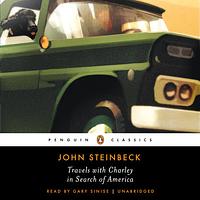Take a photo of a barcode or cover
I'm not sure I can give a review of this book that is subjective. I read it as a kid and loved it. I read it until the book fell apart. I just bought a new copy and still love it. I feel like Steinbeck is, in this book, a kindred spirit. He's human and his views are flawed. It really is a nice view of America in the 1960s (good and bad). One of my all time favorite books.
adventurous
informative
reflective
slow-paced
adventurous
emotional
funny
informative
inspiring
reflective
relaxing
medium-paced
well....THAT was disappointing. at moments, it reminded me (but in poorer style) to the social commentary sidebars steinbeck took in [b:The Grapes of Wrath|4397|The Grapes of Wrath|John Steinbeck|https://i.gr-assets.com/images/S/compressed.photo.goodreads.com/books/1549346045l/4397._SY75_.jpg|2931549], but in 'travels with charley' they seemed clunky and dry. i was hoping for a bit more of steinbeck's personality in reading this book. while there were glimpses of him, i feel as though he held himself back from being overly personal. the bits of steinbeck that were revealed were not always likeable - so that is a challenge to my steinbeck love. plus there's the whole 'steinbeck is a big fat liar' issue': the controversy surrounding the book, and steinbeck's (and his publisher's) lack of honesty and truthfulness about 'charley'. i began reading [b:Dogging Steinbeck: How I Went in Search of John Steinbeck's America, Found My Own America, and Exposed the Truth about 'Travels with Charley'|17246909|Dogging Steinbeck How I Went in Search of John Steinbeck's America, Found My Own America, and Exposed the Truth about 'Travels with Charley'|Bill Steigerwald|https://i.gr-assets.com/images/S/compressed.photo.goodreads.com/books/1358203474l/17246909._SY75_.jpg|23682186], by [a:Bill Steigerwald|6877201|Bill Steigerwald|https://images.gr-assets.com/authors/1358202623p2/6877201.jpg] last night. mostly to try and gain a better understanding of steinbeck's project. so that's a bit weird, isn't it? reading a contemporary investigative journalist to gain a clearer picture of a journey/writing project that took place 50 years ago. but there you go. i have been wondering if my small bit of knowledge of the issues with 'charley' tainted my enjoyment of the read, and i don't think so. i was ready and open to enjoy travelling around the USA with john and charley...but was left thinking 'how soon can i get out of this truck?' (the truck, mind you, is totally cool!!)
OH! i would also like to call bullshit: bullshit, john steinbeck. bullshit! sorry!!
anyway -- i am feeling a bit bummed after reading 'travels with charley'.
OH! i would also like to call bullshit:
Spoiler
COME ON! who goes out into a bay, DURING A DEVASTATING HURRICANE, to re-secure a boat and then swims (SWIMS!!!) back to shore?? NO ONE - that's who.anyway -- i am feeling a bit bummed after reading 'travels with charley'.
On the long journey doubts were often my companions. I've often always admired those reporters who can descend on an area, talk to key people, ask key questions, take samplings of opinions, and then set down an orderly report very like a road map. I envy this technique and at the same time do not trust it as a mirror of reality. I feel that there are too many realities. What I set down here is true until someone else passes that way and rearranges the world in his own style. In literary criticism the critic has no choice but to make over the victim of his attention into something the size and shape of himself." (pg. 60).
In such a way, Steinbeck's journey in Rocinante, his trusty metal steed, and with Charley, his gregarious French poodle, is not quite "in search of America," as his subtitle puts it, but rather "in search of Steinbeck's America." It is my opinion that it is nearly impossible for anyone who has spent a significant time living in America, regardless of which state or their origin, to not be struck at some point by an overwhelming sense of wanderlust. America is improbably vast and inscrutable, yet it is also a nation forever on the move, as Steinbeck discovered in his interactions with the mobile home populace. From its very inception, America is a nation of dynamism, shaped by the relentless drumbeat of hooves and rumblings of wagon-wheels of those seeking better fortune. Even as it ferociously projects an image of itself to the world, Americans never stopped in their attempt to define itself, perhaps an ultimately hopeless endeavor for a nation so young and restless, filled to the brim with a million and one realities.
On his journey, starting in the Northeastern states of New York and then thrusting into Maine, looping around back through the great Mid East, the Mid West, down to the Pacific coast, flying through Texas and then finally the South, John Steinbeck does his best to search for his America, often luring fellow travelers with some coffee, whiskey, or in one especially touching instance, burgundy. This rotating cast of characters, at least the ones he deemed worthwhile enough to write about, served as a multi-faced interlocutor for Steinbeck to hold an ongoing conversation with as he probed for the true nature of America (for instances when travelers were taciturn or absent, Charley proved to be just as articulate). This conversation in a thousand parts became the basis for his reflection, an intimate look at what he liked and disliked about what he saw and felt. His contempt for "the great highspeed slashes of concrete and tar called thruways, or super-highways" for example. His hatred of "governments, all governments. It is always the fine print, carried out by fine-print men." His disdain of the "oven-fresh, spotless and tasteless" food found in motels along the highways, "untouched by human hands." His fascination and desire "to listen, to hear speech, accent, speech rhythms, overtones and emphasis." His undying love for Montana, "a great splash of grandeur" where "people had time to pause in their occupations to undertake the passing art of neighborliness." His bafflement with Texas. And finally, as he begins his trip home through the American South, his "weary nausea" at the ugliness he witnessed in New Orleans, where he stared naked racism in the face, or what he called "three hundred years of fear and anger and terror of change in a changing world." How ironic it is for a nation constantly changing, a nation of "restless people, a mobile people, never satisfied with where they are as a matter of selection" to be so beholden and clinging with bloody fingers to the darkest chapters of its history.
In true Steinbeck style, the prose is accessible and deceptively vulnerable, with a sardonic flair at times, mixed in with just a hint of conspiratorial glint. For a mid-length book of just over 200 pages, Travels with Charley is a surprisingly intimate recount of a journey made, an invaluable cross-section of time, a version of reality composed from many, told in Steinbeck's signature everyman poet/philosopher style. It is a story told with gentleness and wit, the practiced work of a master of his craft. But above all, Travels with Charley is an ember of inspiration, a call to all those who have buried their wanderlust long ago to once again turn their ears towards the call of the horizon.
In such a way, Steinbeck's journey in Rocinante, his trusty metal steed, and with Charley, his gregarious French poodle, is not quite "in search of America," as his subtitle puts it, but rather "in search of Steinbeck's America." It is my opinion that it is nearly impossible for anyone who has spent a significant time living in America, regardless of which state or their origin, to not be struck at some point by an overwhelming sense of wanderlust. America is improbably vast and inscrutable, yet it is also a nation forever on the move, as Steinbeck discovered in his interactions with the mobile home populace. From its very inception, America is a nation of dynamism, shaped by the relentless drumbeat of hooves and rumblings of wagon-wheels of those seeking better fortune. Even as it ferociously projects an image of itself to the world, Americans never stopped in their attempt to define itself, perhaps an ultimately hopeless endeavor for a nation so young and restless, filled to the brim with a million and one realities.
On his journey, starting in the Northeastern states of New York and then thrusting into Maine, looping around back through the great Mid East, the Mid West, down to the Pacific coast, flying through Texas and then finally the South, John Steinbeck does his best to search for his America, often luring fellow travelers with some coffee, whiskey, or in one especially touching instance, burgundy. This rotating cast of characters, at least the ones he deemed worthwhile enough to write about, served as a multi-faced interlocutor for Steinbeck to hold an ongoing conversation with as he probed for the true nature of America (for instances when travelers were taciturn or absent, Charley proved to be just as articulate). This conversation in a thousand parts became the basis for his reflection, an intimate look at what he liked and disliked about what he saw and felt. His contempt for "the great highspeed slashes of concrete and tar called thruways, or super-highways" for example. His hatred of "governments, all governments. It is always the fine print, carried out by fine-print men." His disdain of the "oven-fresh, spotless and tasteless" food found in motels along the highways, "untouched by human hands." His fascination and desire "to listen, to hear speech, accent, speech rhythms, overtones and emphasis." His undying love for Montana, "a great splash of grandeur" where "people had time to pause in their occupations to undertake the passing art of neighborliness." His bafflement with Texas. And finally, as he begins his trip home through the American South, his "weary nausea" at the ugliness he witnessed in New Orleans, where he stared naked racism in the face, or what he called "three hundred years of fear and anger and terror of change in a changing world." How ironic it is for a nation constantly changing, a nation of "restless people, a mobile people, never satisfied with where they are as a matter of selection" to be so beholden and clinging with bloody fingers to the darkest chapters of its history.
In true Steinbeck style, the prose is accessible and deceptively vulnerable, with a sardonic flair at times, mixed in with just a hint of conspiratorial glint. For a mid-length book of just over 200 pages, Travels with Charley is a surprisingly intimate recount of a journey made, an invaluable cross-section of time, a version of reality composed from many, told in Steinbeck's signature everyman poet/philosopher style. It is a story told with gentleness and wit, the practiced work of a master of his craft. But above all, Travels with Charley is an ember of inspiration, a call to all those who have buried their wanderlust long ago to once again turn their ears towards the call of the horizon.
Steinbeck travels around the USA with a poodle and makes smalltalk with the locals. About as interesting as it sounds.
Another Steinbeck winner, enjoyed this and it was interesting to compare against my own cross country journey and how the country has changed.
possibly one of the best books i've ever read. i don't know why it took me so long to get to it. his thoughts on life, his approach to humanity, and the way he understood how the world worked and how it was changing - brilliant. got goosebumps a few times and can't stop thinking about some of the lines - particularly when he writes that humans have overcome all enemies but ourselves.
funny
informative
inspiring
medium-paced
I’m not sure this country has changed all that much. It certainly isn’t any greater.






